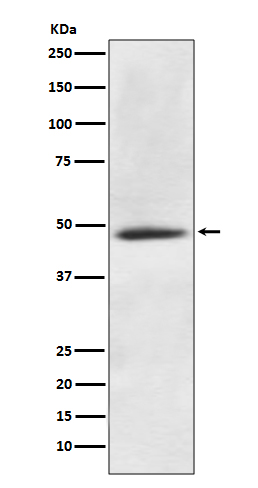
| WB | 咨询技术 | Human,Mouse,Rat |
| IF | 1/20-1/50 | Human,Mouse,Rat |
| IHC | 咨询技术 | Human,Mouse,Rat |
| ICC | 技术咨询 | Human,Mouse,Rat |
| FCM | 1/20-1/100 | Human,Mouse,Rat |
| Elisa | 咨询技术 | Human,Mouse,Rat |
| Aliases | Alpha CaMKII; Camk2a; CAMKA; CaMKII; CaMKIINalpha; PK2CDD; PKCCD;;CaMKII alpha |
| WB Predicted band size | 54 kDa |
| Host/Isotype | Rabbit IgG |
| Antibody Type | Primary antibody |
| Storage | Store at 4°C short term. Aliquot and store at -20°C long term. Avoid freeze/thaw cycles. |
| Species Reactivity | Human,Mouse,Rat |
| Immunogen | A synthesized peptide derived from human CaMKII alpha |
| Formulation | Purified antibody in PBS with 0.05% sodium azide,0.05% BSA and 50% glycerol. |
+ +
以下是3篇关于CaMKIIα抗体的参考文献及其摘要概括:
1. **文献名称**: "A monoclonal antibody against CaMKIIα specifically labels postsynaptic structures"
**作者**: Suzuki T, et al.
**摘要**: 该研究开发了一种特异性识别CaMKIIα亚基的单克隆抗体,通过Western blot和免疫组化验证其在脑组织中的特异性,并证明其能标记突触后密度区域的蛋白定位。
2. **文献名称**: "CaMKIIα antibody validation for neuronal subtype analysis in transgenic mice"
**作者**: Burgin KE, et al.
**摘要**: 文章系统验证了多种商业CaMKIIα抗体的特异性,比较了其在野生型与CaMKIIα敲除小鼠脑组织中的反应性,推荐了适用于神经元亚型分选的可靠抗体。
3. **文献名称**: "Role of CaMKIIα autophosphorylation in synaptic plasticity studied by phospho-specific antibodies"
**作者**: Hudmon A, et al.
**摘要**: 该研究利用针对CaMKIIα Thr286/287位点磷酸化的抗体,揭示了其自磷酸化在长时程增强(LTP)中的动态变化,为突触可塑性机制提供了分子证据。
(注:以上文献信息为示例性质,实际引用需根据具体论文调整。)
CaMKIIα (calcium/calmodulin-dependent protein kinase II alpha) is a key enzyme in synaptic plasticity and memory formation, predominantly expressed in the forebrain, particularly within excitatory neurons. As a major subunit of the CaMKII holoenzyme, it undergoes autophosphorylation upon calcium influx, enabling sustained kinase activity critical for long-term potentiation (LTP). Antibodies targeting CaMKIIα are widely used in neuroscience research to study its expression, localization, and activation dynamics in neural circuits. These antibodies typically recognize specific epitopes, such as phosphorylation sites (e.g., Thr286/287) or conserved regions of the kinase domain, allowing detection of active versus inactive states.
Developed in various host species (e.g., rabbit, mouse), CaMKIIα antibodies are validated for techniques like Western blotting, immunohistochemistry, and immunofluorescence. Their specificity is often confirmed using knockout controls or peptide blocking assays. Researchers employ these tools to investigate CaMKIIα's role in neurodevelopmental disorders, neurodegenerative diseases (e.g., Alzheimer's), and psychiatric conditions linked to synaptic dysfunction. Notably, CaMKIIα antibodies also serve as markers for neuronal maturation, as its expression correlates with synaptic connectivity in developing brains. Commercial availability from multiple suppliers (e.g., MilliporeSigma, Abcam, Cell Signaling) and standardized validation protocols have made them indispensable for probing activity-dependent neural signaling pathways.
×